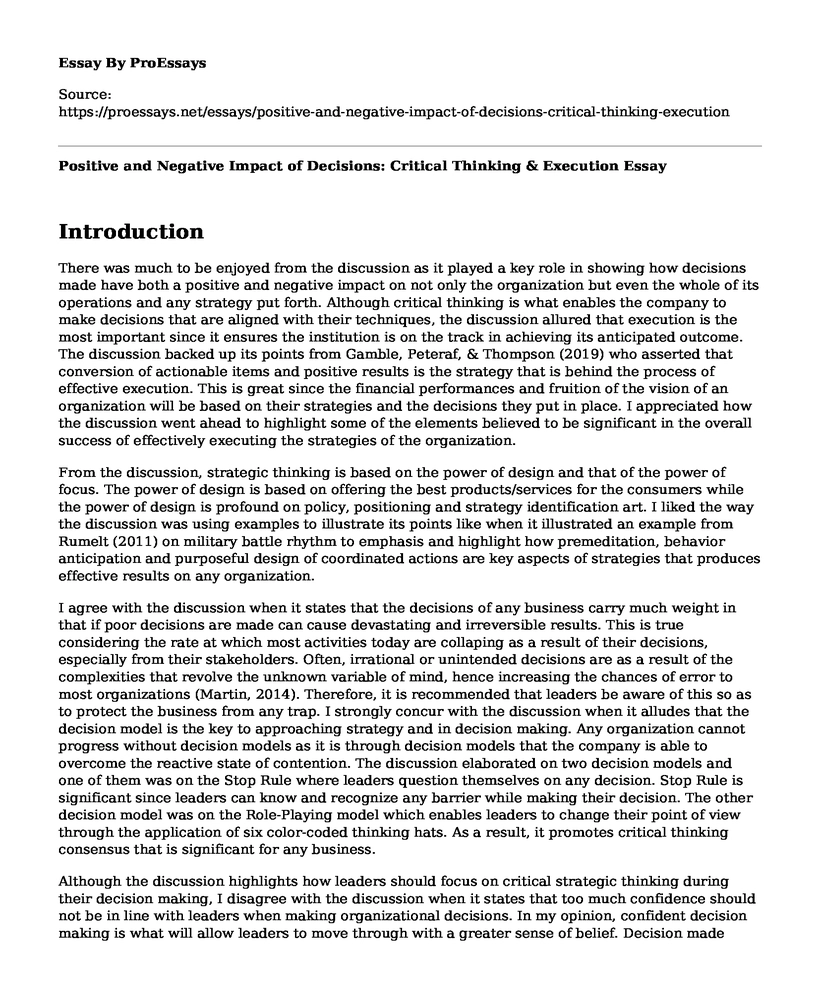Introduction
There was much to be enjoyed from the discussion as it played a key role in showing how decisions made have both a positive and negative impact on not only the organization but even the whole of its operations and any strategy put forth. Although critical thinking is what enables the company to make decisions that are aligned with their techniques, the discussion allured that execution is the most important since it ensures the institution is on the track in achieving its anticipated outcome. The discussion backed up its points from Gamble, Peteraf, & Thompson (2019) who asserted that conversion of actionable items and positive results is the strategy that is behind the process of effective execution. This is great since the financial performances and fruition of the vision of an organization will be based on their strategies and the decisions they put in place. I appreciated how the discussion went ahead to highlight some of the elements believed to be significant in the overall success of effectively executing the strategies of the organization.
From the discussion, strategic thinking is based on the power of design and that of the power of focus. The power of design is based on offering the best products/services for the consumers while the power of design is profound on policy, positioning and strategy identification art. I liked the way the discussion was using examples to illustrate its points like when it illustrated an example from Rumelt (2011) on military battle rhythm to emphasis and highlight how premeditation, behavior anticipation and purposeful design of coordinated actions are key aspects of strategies that produces effective results on any organization.
I agree with the discussion when it states that the decisions of any business carry much weight in that if poor decisions are made can cause devastating and irreversible results. This is true considering the rate at which most activities today are collaping as a result of their decisions, especially from their stakeholders. Often, irrational or unintended decisions are as a result of the complexities that revolve the unknown variable of mind, hence increasing the chances of error to most organizations (Martin, 2014). Therefore, it is recommended that leaders be aware of this so as to protect the business from any trap. I strongly concur with the discussion when it alludes that the decision model is the key to approaching strategy and in decision making. Any organization cannot progress without decision models as it is through decision models that the company is able to overcome the reactive state of contention. The discussion elaborated on two decision models and one of them was on the Stop Rule where leaders question themselves on any decision. Stop Rule is significant since leaders can know and recognize any barrier while making their decision. The other decision model was on the Role-Playing model which enables leaders to change their point of view through the application of six color-coded thinking hats. As a result, it promotes critical thinking consensus that is significant for any business.
Although the discussion highlights how leaders should focus on critical strategic thinking during their decision making, I disagree with the discussion when it states that too much confidence should not be in line with leaders when making organizational decisions. In my opinion, confident decision making is what will allow leaders to move through with a greater sense of belief. Decision made through confidence boost self-esteem and one reaffirms that he/she is capable and is worthy with the capability of making strong decisions for the company. If a leader is struggling to make confident decisions, then he/she opens up for a place to be influenced by others especially those that are not for the best interest of the company. All in all, the discussion was very informative and it played a key role in most organizations through designing and executing strategy with excellence.
References
Gamble, J., Peteraf, M., & Thompson, A. (2019), Essentials of Strategic Management
(6th Edition) The quest for competitive advantage, New York, NY: McGraw-Hill Education.
Martin, R. L., (2014) Strategic planning, The big lie of strategic planning. Harvard Business Review. Retrieved from https://hbr.org/2014/01/the-big- lie-of-strategic-planning.
Rumelt, R. (2011), Good strategy/bad strategy: The difference and why it matters, New York, NY: Crown Publishing Group.
Cite this page
Positive and Negative Impact of Decisions: Critical Thinking & Execution. (2023, Apr 08). Retrieved from https://proessays.net/essays/positive-and-negative-impact-of-decisions-critical-thinking-execution
If you are the original author of this essay and no longer wish to have it published on the ProEssays website, please click below to request its removal:
- The Theory of Extrinsic Motivation Paper Example
- Child's Development Level Observation Case Study
- Argumentative Essay on Dress Codes and School Uniforms
- Research Paper on Growth & Development: How Childhood Nutrition Shapes Life as an Adult
- Essay Example on Modern Technology: Testing and Teaching in Linguistics
- Paper Example on Tech in the Classroom: Benefits & Reflections
- Paper Example on Bullying Behavior: A Global Problem Requiring Maximum Focus







